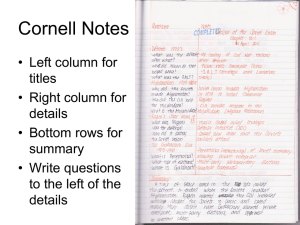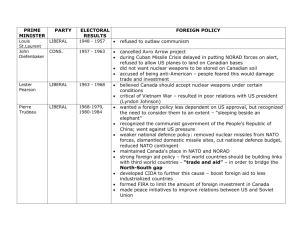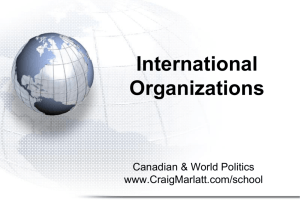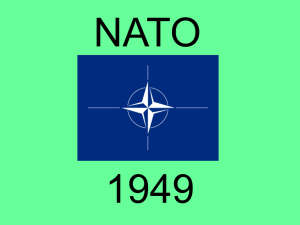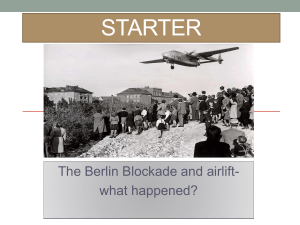Canada's Global Partners
advertisement
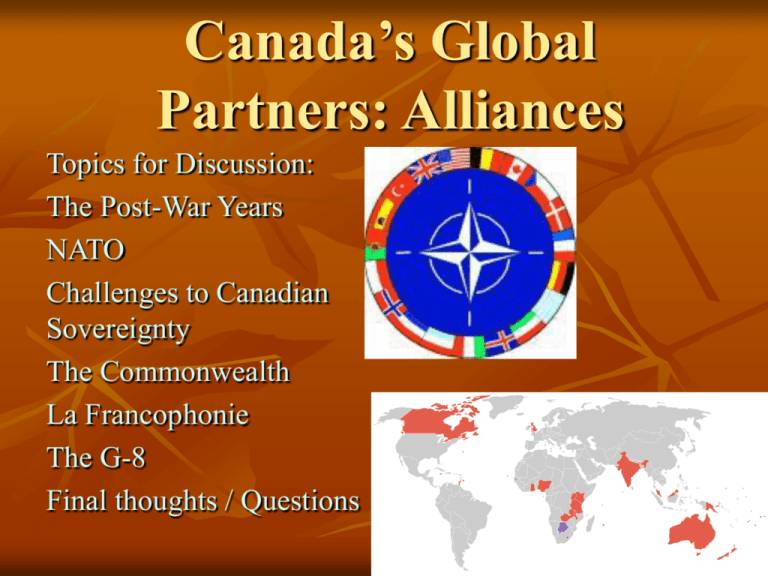
Canada’s Global Partners: Alliances Topics for Discussion: The Post-War Years NATO Challenges to Canadian Sovereignty The Commonwealth La Francophonie The G-8 Final thoughts / Questions The Post War Years After WW2, Canada had the world’s third largest navy and fourth largest airforce. Canada was also one of the richest nations in the world since many European nations were economically devastated by the immediate effects of WW2 Canada’s Navy in the Bedford Basin, NS Canadian Airforce The “Cold War” After the war there were increasing tensions between the Soviet Union, the United States and its allies. In 1949 Western nations (Britain, United States, W. Germany, Canada, etc.) formed the NATO Alliance (North Atlantic Treaty Organization) Nations of Eastern Europe (USSR,E. Germany, Romania, etc.) formed the Warsaw Pact NATO – Homepage NATO - Who's who? (Canada’s profile within NATO) NATO and the Warsaw Pact The Cold War The Berlin Wall With increasing tensions between the communist East and the Capitalist West, a wall was erected To separate East Berlin (East Germany) From West Berlin Challenges to Canadian Sovereignty In 1957, there were more than 20 Distant Early Warning (DEW) sites created on the 70th parallel. They were paid for and maintained by the United States. The stations were designed as an early warning system for incoming Soviet missles. Although the sites were clearly on Canada’s territory, they were owned and maintained by the United States. Canada was not involved. Canada consented. Was this a threat to Canadian independence? The DEW Line Challenges to Canadian Soverignty The Americans knew that the shortest distance between the USSR and the USA was through the Arctic. As a result, they insisted that Canada allow them to install these sites DEW Line Radar Site in Canada’s Arctic NATO Today Tensions have lessened between the Warsaw Pact nations and NATO. In fact, some former members of the Warsaw Pact are now members of NATO! (e.g. Czech Republic, Poland, Latvia, etc) Question: Does Canada’s membership within NATO threaten Canada’s sovereignty? For a discussion of NATO’s agenda and current operations around the world click here Question: Is Canada’s involvement in NATO a reflection of Canada’s traditional global values? What are Canada’s values? What is our global reputation? The Commonwealth Founded in 1931, the Commonwealth is an organization of former British colonies that today consists of 51 nations and represents 1.7 Billion citizens. (Some former colonies are not members such as the United States. Member states meet every two years to discuss economic, social, political and environmental issues The Commonwealth The purpose of the commonwealth is the following: To support the United Nations in its efforts for greater peace and security in the world To combat racism and oppression in the world To promote the spread of democracy around the world (e.g. Case study: Nigeria) Reduce economic disparities that exist within nations Canada’s Role in the Commonwealth Canada played an instrumental role in the ending of Apartheid in South Africa Recently, Canada has used the Commonwealth as a vehicle for combating global terrorism Canada also uses the Commonwealth to spread its foreign aid funding through the usage of NGOs (Nongovernmental organizations) The Commonwealth has also been used by Canada to address global health issues such as the spread of the HIV/AIDs virus. La Francophonie La Francophonie is an organization of French speaking nations that represent 5 continents. This organization has 53 member countries and represents 10% of the world’s population Much like the Commonwealth, La Francophonie meets every 2 years to discuss economic, social and political issues and to implement a vast array of initiatives (foreign aid, health care, and an international games) Canada’s role in La Francophonie Canada plays an important role since it is one of the wealthiest members of this organization Canada has played a major role in promoting human rights around the world through La Francophonie (e.g. initiatives in Haiti) Some Canadians have questioned the value of La Francophonie with respect to financing (e.g. tax dollars to fund La Francophonie Games). Question: Should Canada continue to be a member of La Francophonie? Is La Francophonie obsolete given the role that Canada currently plays under the umbrella of the United Nations? The G-8 The G-8 consists of: The United States, Japan, Italy, Germany, France, Great Britain, Canada (which joined in 1976) and Russia (which joined in 1998) Although the G-8’s main role is in the area of economic policy, the organization also deals with issues such as drug smuggling, combating terrorism and human rights abuses. The organization meets once a year and represents some of the most powerful nations on earth. Some question the Value of the G-8 with the exclusion of emerging powers such as China and India (hence the G-20). However, supporters of the G-8 stress that Canada can use its influence in this membership to forward its economic, social and political goals around the world Final Thoughts/ Questions Does Canada benefit from its memberships in international organizations? Are some organizations more valuable than others? What are the benefits of membership? What are the costs of membership? Write a 200 word paragraph in response to the following question: Canada’s membership in International organizations represent a threat to Canadian Sovereignty. Discuss Works Consulted Books: Cohen, Andrew, While Canada Slept: How we lost our place in the world. Toronto, McClelland and Steward, 2003 John Ruypers et al., Canadian and World Politics. Toronto, Emond Montgomery Publications, 2005. Websites: http://www.nato.int/cps/en/natolive/nato_countries.htm (All images enclosed taken from Google images)

